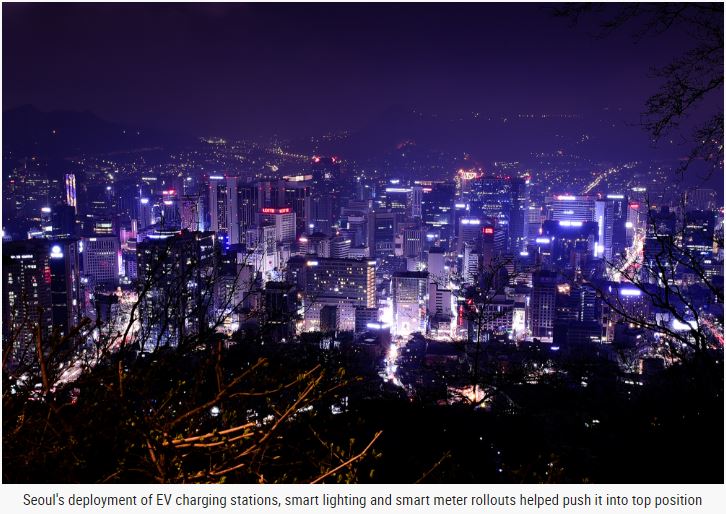[UK_CityToday] Seoul tops smart city energy ranking
Seoul tops smart city energy ranking
8th January 2018 Jonathan Andrews
(Source: https://cities-today.com/seoul-tops-smart-city-energy-ranking/)
Seoul has come out on top of a ranking by Juniper Research which analysed global cities to assess their performance and approach towards energy consumption and delivery. The South Korean capital was followed by San Francisco and New York. Portland and Barcelona were ranked in fourth and fifth place respectively. North America as a region was the top performer.

“Seoul’s large-scale deployment of electric vehicle charging infrastructure, smart street lighting and smart meter rollouts will undoubtedly accelerate the development of smart grid infrastructure to manage these elements,” said Steffen Sorrell, research author at Juniper Research.
The new data, compiled in the study Smart Cities: Strategies & Forecasts in Energy, Transport & Lighting 2017-2022, also reveals city residents could save US$14 billion a year in energy bills over the next four years due to the development of smart grids linked to smart cities. This saving is up from the US$3.4 billion saving estimated for 2017, thanks to smart meter rollouts, energy-saving policies and sensing technology to improve grid reliability and efficiency.
The study highlighted that the high cost of carbon capture and storage technology is making fossil fuel investment uneconomical. With the projected cost of renewable energy sources such as wind and solar falling close to US$60 per MWh (Megawatt hour) in 2022, Juniper predicts that inevitable investment would force accelerated deployment of smart grid solutions to reliably scale renewable energy.
With smart city budgets now being discussed and allocated worldwide, policy has become more important than technology, the report said, arguing that MaaS (Mobility as a Service) could drastically reduce city congestion by virtue of nearly eliminating the need for private transport. Sorrell added that MaaS can happen without smart grids and vice-versa.
However, Sorrell warned that the increase of electric vehicle use has brought about concerns over not only the establishment of sufficient charging infrastructure, but also grid resilience.
“If combustion vehicles were fully replaced by electric vehicles today, electrical grid systems would simply collapse under increased demand,” he told Cities Today. “There must be increased collaboration between cities, utilities and other stakeholders to establish pilot projects and test beds to establish how best to avoid these issues; this should happen sooner rather than later.”
Sorrell says that MaaS would never come to fruition without strict city policy enforcement and for that reason, based on the data, he predicts that cities in East Asia would become ‘true’ smart cities earlier than their Western counterparts.